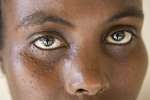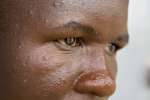UNHCR urges suspension of returns to Nigeria from Niger
News Stories, 16 January 2015
GENEVA, January 16 (UNHCR) – The UN refugee agency on Friday expressed concern about the return to Nigeria of hundreds of refugees from Niger this week as the number of people fleeing militant attacks in northern Nigeria continued to grow. UNHCR urged the authorities in both countries to halt the repatriation.
Spokesman William Spindler told journalists in Geneva that UNHCR had received reports that the refugees were transported on nine buses to Maiduguri, the capital of Borno State in Nigeria. "Another 11 buses are currently parked in the town of Gagamari in Niger's Diffa region, waiting to take more refugees back to Nigeria," he added.
"Given the volatile security situation in Borno state and the recent attacks by insurgents, UNHCR is concerned about the nature of these returns and has asked the authorities to stop this operation until there are proper safeguards and a legal framework between Nigeria, Niger and UNHCR," Spindler said.
Refugees fleeing the fighting between militants and government forces in north-east Nigeria continue to arrive in Niger and Chad with harrowing tales of killings and destruction, including the extreme violence inflicted on the lakeside town of Baga earlier this month.
"A woman, who ran away from Baga with her five children and her husband, said she saw insurgents run over women and children with their cars, shoot at people and use knives to cut their throats in the street. She estimated that hundreds had been killed in Baga," Spindler said. "The terrified family managed to escape at night before reaching Maiduguri, from where they took a bus to Niger," he added.
Some 13,000 Nigerian refugees have arrived in western Chad since the January 3-7 attacks on Baga. UNHCR and the governmental Commission Nationale d'Accueil, et de Réinsertion des Réfugiés et des Rapatriés have registered more than 6,000 refugees.
Dozens of refugees continue to arrive every day, many by canoe over Lake Chad to areas such as Ngouboua and Bagasola, some 450 kilometres north-west of the Chadian capital N'djamena. Some 16,000 Nigerian refugees have now arrived in Chad since May last year.
"We are concerned that refugees from Baga and the surrounding area are choosing to flee over the lake into Chad as this may indicate that the overland route into Niger is blocked by insurgents," UNHCR's Spindler said in Geneva.
"Our teams in Chad report that they have identified 104 unaccompanied children, who have been separated from their families while fleeing the attacks in Baga. They have been placed in foster families while waiting to be reunited with their own," he added.
At the same time, UNHCR has started the relocation of some 2,000 refugees, who were stranded on the Lake Chad islands of Koulfoua and Kangalam, to the newly opened site of Dar Es Salam, near Bagasola. The site, which presently hosts some 1,600 refugees, is located 70 kilometres from the border with Nigeria and will be able to accommodate up to 15,000 people. The attacks on Baga have also pushed some 570 people to flee to Niger's Diffa region – with some of them having first crossed through Chad before reaching Niger.
Since a state of emergency was declared in Adamawa, Borno and Yobe states in north-eastern Nigeria in May last year, an estimated 153,000 people have fled to neighbouring countries. To date, UNHCR has registered more than 37,000 Nigerian refugees in Cameroon, some 16,000 people have arrived in Chad, and the authorities in Niger estimate that more than 100,000 people, both Nigerian refugees and Niger nationals, have arrived from the war-torn north-east of Nigeria. In 2015 alone, the violence has led to an exodus of 19,000 people


















































